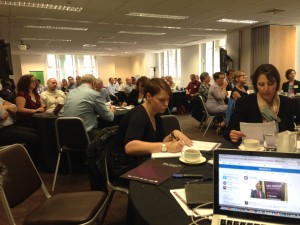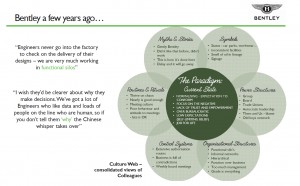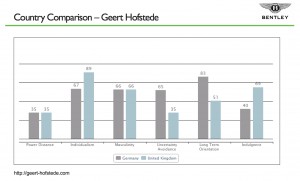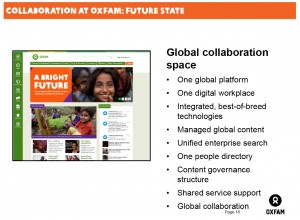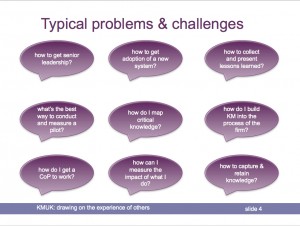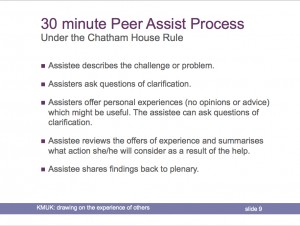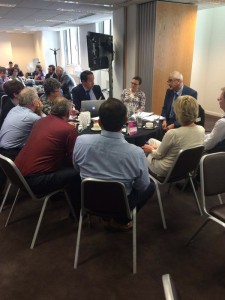It’s conference season which means I get to go to nice places and meet and learn from interesting people. This week I was in London for the annual Knowledge Management UK event and a cracking good couple of days it turned out to be.
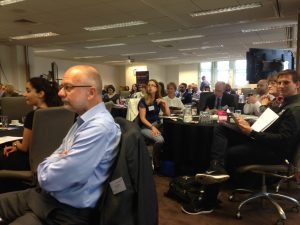 Well attended by 60 or so KIM professionals, it was chaired by Ian Rodwell @Irodwell of Linklaters who I’d recommended and who did me and Laura Brooke of Ark @LauraAtArk, proud.
Well attended by 60 or so KIM professionals, it was chaired by Ian Rodwell @Irodwell of Linklaters who I’d recommended and who did me and Laura Brooke of Ark @LauraAtArk, proud.
From the ice breaker opener onwards Ian’s touch was light but assured and the delegates all participated with enthusiasm.
What surprised me?
- I got something out of every presentation which might sound a bit arrogant but when you’ve been to many KM events there are usually a couple that don’t quite cut it. This time each speaker slotted in well with the next and the event flowed.
- The number of KM ‘Veterans’ attending for the first time in a long while commenting how lonely the role can be (whatever it’s called) and how durable KM’ers have to be.
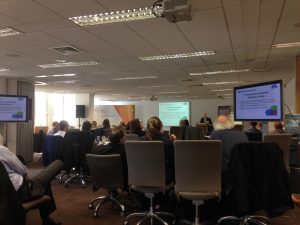 Learning that the Govt’s 5 year Knowledge & Information Strategy (GKIS) produced in 2013 is still not published and unlikely to see the light of day. Yet work is still going on as David Smith explained to create career pathways for the cadre of professionals who comprise the civil service’s Knowledge & Information Management profession. I didn’t get the feeling that CILIP are integral to those competency framework discussions which is a missed opportunity on both sides as there is no current industry group that effectively represent the KIM global profession as does a CMI or CIPD in Marketing or Human Resources (Personnel).
Learning that the Govt’s 5 year Knowledge & Information Strategy (GKIS) produced in 2013 is still not published and unlikely to see the light of day. Yet work is still going on as David Smith explained to create career pathways for the cadre of professionals who comprise the civil service’s Knowledge & Information Management profession. I didn’t get the feeling that CILIP are integral to those competency framework discussions which is a missed opportunity on both sides as there is no current industry group that effectively represent the KIM global profession as does a CMI or CIPD in Marketing or Human Resources (Personnel).- Discovering that the average age of people in E&Y is 27 (hence generation Z to the fore). E&Y’s big challenge for is to move from a vertical to horizontal communications and employee engagement approach. Their Communities of Practice / Skills are a great way of cutting across silos.
- Despite all the ballyhoo around technology search is still not cutting it for most and my recent musings on the continued need for Assisted Search valid.
What intrigued me?
- The session on Artificial Intelligence (AI) whcih included the suggestion that it is ‘parked on the lawn’ of call centres and people who have to read long books for a living and are also engaged in risk management. Today AI does not do emotional intellience very well but that is changing despite reservations about the ethics of it. Linklaters are a good example of an organisation experimenting with AI to improve efficientcy.
- Nick Milton’s @nickknoco thoughts on adopting the 7 step Lean Model for a KM programme and the wastes of KM supply chain: excess production, delay, too many steps, excess hand-offs, defects etc. By a strange coincidence 7 came up in my presentation when I talked about the 7 ‘ates of a Knowledgeur. A separate blog will be forthcoming to coincide with my address to the CILIP annual Confrence in three weeks time.
What delighted me?
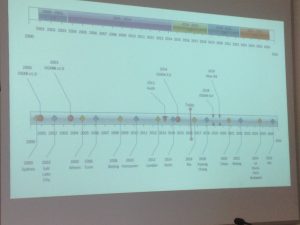 Christopher Payne’s @cjapayne excellent account of the Knowledge Management effort that is embedded in the Olympics. It is the most visible of all Project KM programmes (see alongside) with great potential to act as a benchmark for all big cross border multinational projects. Imagine the expertise they have developed (with quite a small team) in transferring knowledge from London to Rio to Tokyo all in the gaze of the global public. I know Chris is keen to share his
Christopher Payne’s @cjapayne excellent account of the Knowledge Management effort that is embedded in the Olympics. It is the most visible of all Project KM programmes (see alongside) with great potential to act as a benchmark for all big cross border multinational projects. Imagine the expertise they have developed (with quite a small team) in transferring knowledge from London to Rio to Tokyo all in the gaze of the global public. I know Chris is keen to share his 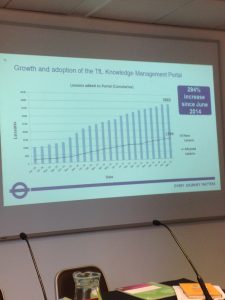 knowledge with the greater KM community so contact him or hear him speak.
knowledge with the greater KM community so contact him or hear him speak.- TfL’s approach outlined by @LemmerLutz to making great use of Lessons Learned and feeding improvements back into process. The graph alongside illustrates the successful postings of lessons to their KM portal (up nearly 300% in 2 years).
- The broad acceptance that you can achieve a lot with a little. The Financial Conduct Authority presentation being a great example of how to make effective use
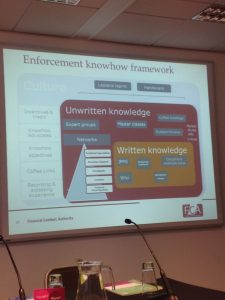 of people by using communities and having an easily understood framework. I noted though that poor search is a real barrier to adoption and that the lack of a technical underpinning a constraint.
of people by using communities and having an easily understood framework. I noted though that poor search is a real barrier to adoption and that the lack of a technical underpinning a constraint. - Hearing from a couple of people how Random Coffee Sessions can be effective. The idea is simple: develop a list of people who are interested in having short coffee meetings with peers on a 1:1 basis and pair them up on a periodic basis.
What frustrated me
- The continued reluctance to share thoughts / observations on Twitter, a stance at odds with the audience’s oft stated desire to ‘Work out Loud”. How can you encourage others to do so if you don’t do it yourself? I wrote more on this subject a year back coining this phrase: It was like throwing a dart into a vacuum.
What did I not hear I expected to?
- Social Network Analysis: Despite a real focus on Communities Social Network Analysis was not discussed. Not knowing who people go to for answers or who knows what is a risk to many businesses if those key but often hidden people depart. To a large extent the risk from the sudden departure of the ‘Expert’ is diminishing with the rise of empowered and informed knowledge workers and processes that contain embedded knowledge.
And finally
My favourite quote (used in the content of maintaining focus):
Don’t be like a dog who sees a squirrel

